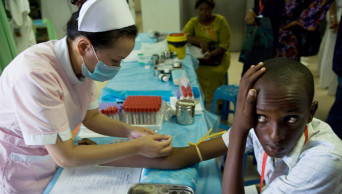health care
Patients underserved as KMCH overwhelmed with bed shortage, inadequate manpower
Patients at Khulna Medical College and Hospital (KMCH) have been struggling to receive proper treatment due to overcrowding and manpower shortage.
The authorities of KMCH have been scrambling to provide treatment due to bed shortage as the number of patients is three times higher than the capacity of the 500-bed hospital.
Besides, physicians at the outdoor department of the hospital are also having a difficult time with 1500 patients on average every day seeking medical treatment.
3 KMCH doctors missing since Friday
Deputy director of KMCH, Dr Niaz Mustafi Chwodhury, said a record number of patients are thronging at the hospital as the authorities have expanded healthcare services after opening new departments.
“Though we are struggling a lot to provide medical services to the record number of patients, we are trying our best,” he said.
Clash with medicine traders: KMCH students boycott classes
During a recent visit to the hospital, this UNB correspondent found that the floors, veranda, and staircases near the entrance of the hospital building are overcrowded with patients. Many were receiving treatment, resting on mats on the floor, close to the bathroom and staircases due to shortage of beds.
Jahangir Alam, who came to the hospital with his father from Rupsha upazila, said, “I brought my father with respiratory problems. He has been receiving treatment on the floor of the veranda for the past seven days. My father is suffering a lot due to the heat as there is no fan in the veranda.”
The staff of the hospital are also responding slowly as they are unable to cope with the overwhelming number of patients.
According to hospital sources, 81 posts under 31 wards of 16 departments at KMCH have remained vacant for a long period — forcing staff to deal with patients with inadequate manpower.
KMCH intern doctors call for work abstention over clash between students and medicine traders
2 years ago
Every 2 minutes a woman dies due to pregnancy or childbirth: UN agencies
Every two minutes, a woman dies during pregnancy or childbirth, according to the latest estimates released today in a report by United Nations (UN) agencies.
The report, ‘Trends in maternal mortality’, reveals alarming setbacks for women’s health over recent years, as maternal deaths either increased or stagnated in nearly all regions of the world.
“While pregnancy should be a time of immense hope and a positive experience for all women, it is tragically still a shockingly dangerous experience for millions around the world who lack access to high quality, respectful health care,” said Dr Tedros Adhanom Ghebreyesus, Director-General of the World Health Organization (WHO).
“These new statistics reveal the urgent need to ensure every woman and girl has access to critical health services before, during and after childbirth, and that they can fully exercise their reproductive rights,” he added.
Read More: UNICEF lauds Bangladesh’ breakthrough to accelerate universal birth registration
The report, which tracks maternal deaths nationally, regionally and globally from 2000 to 2020, shows there were an estimated 287,000 maternal deaths worldwide in 2020. This marks only a slight decrease from 309,000 in 2016 when the Sustainable Development Goals (SDGs) came into effect. While the report presents some significant progress in reducing maternal deaths between 2000 and 2015, gains largely stalled, or in some cases even reversed, after this point.
In two of the eight UN regions – Europe and Northern America, and Latin America and the Caribbean – the maternal mortality rate increased from 2016 to 2020, by 17% and 15% respectively. Elsewhere, the rate stagnated.
The report notes, however, that progress is possible.
For example, two regions – Australia and New Zealand, and Central and Southern Asia – experienced significant declines (by 35% and 16% respectively) in their maternal mortality rates during the same period, as did 31 countries across the world.
Read More: Majority of children with disabilities are not enrolled in any formal education: Survey
“For millions of families, the miracle of childbirth is marred by the tragedy of maternal deaths,” said UNICEF Executive Director Catherine Russell.
“No mother should have to fear for her life while bringing a baby into the world, especially when the knowledge and tools to treat common complications exist. Equity in healthcare gives every mother, no matter who they are or where they are, a fair chance at a safe delivery and a healthy future with their family.”
In total numbers, maternal deaths continue to be largely concentrated in the poorest parts of the world and in countries affected by conflict. In 2020, about 70% of all maternal deaths were in sub-Saharan Africa.
In nine countries facing severe humanitarian crises, maternal mortality rates were more than double the world average (551 maternal deaths per 100,000 live births, compared to 223 globally).
Read More: More Rohingya female teachers need training for increasing literacy among their community
“This report provides yet another stark reminder of the urgent need to double down on our commitment to women and adolescent health,” said Juan Pablo Uribe, Global Director for Health, Nutrition and Population at the World Bank, and Director of the Global Financing Facility.
“With immediate action, more investments in primary health care and stronger, more resilient health systems, we can save lives, improve health and well-being, and advance the rights of and opportunities for women and adolescents.”
Severe bleeding, high blood pressure, pregnancy-related infections, complications from unsafe abortion, and underlying conditions that can be aggravated by pregnancy (such as HIV/AIDS and malaria) are the leading causes of maternal deaths. These are all largely preventable and treatable with access to high-quality and respectful healthcare.
Community-centered primary health care can meet the needs of women, children and adolescents and enable equitable access to critical services such as assisted births and pre- and postnatal care, childhood vaccinations, nutrition and family planning. However, underfunding of primary health care systems, a lack of trained health care workers, and weak supply chains for medical products are threatening progress.
Read More: When classrooms are child-friendly and safe, children are motivated to learn, research shows
Roughly a third of women do not have even four of the recommended eight antenatal checks or receive essential postnatal care, while some 270 million women lack access to modern family planning methods.
Exercising control over their reproductive health – particularly decisions about if and when to have children – is critical to ensure that women can plan and space childbearing and protect their health. Inequities related to income, education, race or ethnicity further increase risks for marginalized pregnant women, who have the least access to essential maternity care but are most likely to experience underlying health problems in pregnancy.
"It is unacceptable that so many women continue to die needlessly in pregnancy and childbirth. Over 280,000 fatalities in a single year is unconscionable,” said UNFPA Executive Director Dr. Natalia Kanem.
“We can and must do better by urgently investing in family planning and filling the global shortage of 900,000 midwives so that every woman can get the lifesaving care she needs. We have the tools, knowledge and resources to end preventable maternal deaths; what we need now is the political will."
Read More: Bangladesh ranks top among the countries to receive free Covid vaccine from WHO: Health minister
The COVID-19 pandemic may have further held back progress on maternal health. Noting the current data series ends in 2020, more data will be needed to show the true impacts of the pandemic on maternal deaths. However, COVID-19 infections can increase risks during pregnancy, so countries should take action to ensure pregnant women and those planning pregnancies have access to COVID-19 vaccines and effective antenatal care.
“Reducing maternal mortality remains one of the most pressing global health challenges,” said John Wilmoth, Director of the Population Division of the Department of Economic and Social Affairs.
“Ending preventable maternal deaths and providing universal access to quality maternal health care require sustained national and international efforts and unwavering commitments, particularly for the most vulnerable populations. It is our collective responsibility to ensure that every mother, everywhere, survives childbirth, so that she and her children can thrive."
The report reveals that the world must significantly accelerate progress to meet global targets for reducing maternal deaths, or risk the lives of over 1 million more women by 2030.
Read More: There are more than 2.3 million cases of breast cancer that occur each year: WHO
3 years ago
People in prisons have rights to health care: HC observes
The High Court on Tuesday observed that people in prisons have rights to health care and the service needs to be provided.
The HC bench of Justice KM Kamrul Kader and Justice Mohammad Ali made the observation when director general of the Directorate General of Health Services (DGHS) Prof Dr Abul Bashar Mohammad Khurshid Alam appeared before it over recruitment of 48 doctors to the vacant posts in the prisons of the country following a writ petition.
The court also asked the DG to take necessary measures to ensure health services to the citizens round the clock.
Read more: HC summons DG of DGHS for not recruiting doctors to fill vacant posts in prisons
The court fixed May 2 for the next hearing over the matter and relieved the DG from appearing before the court in-person.
Lawyer MJR Khan Robin appeared for the writ petitioner in the court while Attorney General AM Amin Uddin stood for the DG.
Attorney General AM Amin Uddin requested the court to consider the matter saying that DHGS failed to comply with its directive over recruitment of 48 doctors to the vacant posts in the prisons due to the Covid pandemic.
DGHS DG Khurshid Alam told the court, "The delay in appointing doctors in the jails is unintentional.”
He also said that he has already appointed doctors to all vacant posts. “The recruitment for 141 doctors have been completed and 136 of them have joined. The remaining five will join soon.”
Besides, the DG tendered an unconditional apology for the delay in implementing the order, said Lawyer MJR Khan Robin.
A draft policy is being prepared for the direct recruitment of doctors in prisons.
The court asked the prison authorities to submit a progress report on the draft policy within the next three months, he added.
On June 23, 2019, the court issued a rule asking the authorities concerned to submit a list on the capacity of prisons, the number of prisoners and doctors and the vacancies of doctors in all prisons across the country.
The jail authorities reported to the court in November 2019 that there were only 10 doctors against 141 posts in 68 prisons. After seeing the report, the High Court ordered recruitment of doctors in the prisons.
Read more: HC summons DGME DG for failure to present documents of a student
On September 21, 2021, it was reported to the court that 112 doctors were appointed in 68 prisons in the country against a total of 141 vacant posts.
Then the HC ordered the speedy appointment of doctors in the remaining vacant posts. But health authorities did not take any initiative in this regard.
Following an appeal, the court upheld the previous order on November 15 last year and ordered the Inspector General of Prisons and the Secretary to the Security Services Department of the Ministry of Home Affairs to submit a report on it.
Later, the Inspector General of Prisons submitted a report on December 13.
According to the report, 68 prisons and a prison hospital in the country have a total number of 141 posts of doctors at various levels. It was reported that that 93 doctors were appointed against 141 posts.
Later, the court ordered the recruitment of doctors to the remaining 38 vacant posts by January 7.
HC summoned the DGHS DG on January 17 as the order was not implemented even though it warned of taking action against those concerned for contempt of court.
3 years ago
Praava Health provides free health care to poor students
Praava Health, a country’s healthcare brand, on Thursday completed its free health camp for the students of Chakar School that works with underprivileged children and other disadvantaged students.
Thirty one children who have little regular access to health services were examined in early September by Praava Health doctors, nurses and other medical practitioners. They were later provided free medical and dental care.
The children visited Praava Health today (Thursday) for further pathological and imaging tests and medicines, said a press release.
Read: DGHS shutters Praava Health Care
Praava Health arranged a progarmme marking the visit of the disadvantaged students.
Speaking at the programme, Praava Health’s Chief Medical Officer Dr Simeen M Akhtar said, “Praava Health believes that everyone should have access to convenient, affordable, and high-quality care.”
As a part of their commitment to community outreach and corporate social responsibility, she said Praava is committed to providing health care support to those who need it the most.
“We feel privileged to have been able to work with these children and give back to this community, particularly when attention to best health practices remains so crucial during the COVID pandemic,” Dr Simeen said.
Read: Praava Health’s brick-and-click model: Bangladesh’s fastest-growing healthcare company raises $10.6 million
During the health camp earlier in September, Dr Lubna and Dr Laila conducted two sessions for the children of Chakar School The School on the Wheel), an innovative digital mobile school.
In an effort to help the school maintain strong hygiene practices and help students with minor injuries, Praava Health also provided free disinfectant liquid and a first aid box to the school.
4 years ago
Digital Healthcare Startups in Bangladesh: An Overview
If the healthcare system is not functioning properly, the citizens have to suffer the consequences, and it is true for any country in the world. Hence, Bangladesh is not different either. Fortunately, Bangladesh is heading towards digitization. In this wake, many digital healthcare startups have been showing prospects. Over the last decade, some online healthcare startups have boomed with the aim of providing improved healthcare service, with better access to healthcare. We have compiled a list of top digital healthcare startups in Bangladesh. Let's get to know them.
Best digital healthcare startups in Bangladesh
Maya
Maya was founded by Ivy Huq Russell in 2011 as a content-based platform focusing on women's health care. But over the past years, it has been redesigned as a health care platform to offer anonymous messaging services about physical, psychological, and mental health questions. Maya Expert, an in-house built AI, answers about 30% of the incoming question with an accuracy rate of 90%.
Maya has their own app on Google Play, and so far, the Maya bot has served around 7.5 million people. They also offer B2B premium service where companies can take care of their employees' mental healthcare. However, Maya has introduced premium services that included video consultation and medicine delivery. Moreover, the company has a Maya Shop that sells lifestyle and healthcare-related products.
Read Top health apps for online doctor consultation services in Bangladesh
Jeeon
Jeeon is a social business registered in the US and based in Bangladesh. Jeeon has been working in Bangladesh since 2015. Jeeon's mission is to improve the health care of rural people in Bangladesh. And with that goal, they work with village doctors and pharmacists.
Jeeon creates supply systems for quality medicines and other health products and prevents counterfeiting. Furthermore, they work on increasing skills and competencies by providing various training to village doctors and pharmacists. Besides these, they also introduce and support new business ideas and new technologies in healthcare to the rural people. To highlight the important role of village doctors and pharmacists in the health sector of Bangladesh, Jeeon tries to contact the policymakers.
Now Jeeon has 4330 pharmacies in their network in different locations of the country, including Dhaka, Mymensingh, Khulna, Jessore, and other places.
Read The 7 Most Promising Tech Startups in Bangladesh
Moner Bondhu
In 2016, Moner Bondhu started its journey with a unique idea. It aims to offer professional counseling at an affordable and accessible cost online. Currently, Moner Bondhu has engagement in three sectors. Firstly, they provide care and support to mentally disturbed people through its helpline – both online and offline.
Secondly, they organize different training sessions, workshops on stress management and create awareness on mental healthcare. Thirdly, Moner Bondhu endorses mental healthcare issues through a weekly radio program on Color's FM 101.6.
According to the organization, they have reached 20,00,000 people so far online and 1,10,000 people through in-person and offline events. Moreover, Moner Bondhu has been working with the RMG sector in partnership with the UNDP to counter the mental health adversities of the RMG workers.
Read Small Business Ideas for F-commerce Startups in Bangladesh during Pandemic
BanglaMeds
Founded in 2017 by Gazi Raffan, BanglaMeds is one of the first online pharmacies in Bangladesh. They offer OTC drugs and prescription medicines delivery around the country. BanglaMeds aims to provide medicine delivery within one to three hours after the confirmation of the order. However, sometimes the delivery time may take two days depending on the customer's location.
The medicine ordering process is simple. You can take a picture or scan your prescription and upload it. Then the pharmacist will contact you to select the meds you want and for the verification. After that, you can get the medicines at your doorsteps. However, you will need to show the prescriptions to receive the delivery.
Apart from medicines, you can order accessories, diabetic kits, baby and mother care products, hygiene products, and more. The order can be done via various methods such as apps, websites, or even the social media platform.
Read Truck Lagbe: Story of a Successful Digital Trucking Startup in Bangladesh
CMED
Started in 2017, CMED is an AI-driven cloud base healthcare service provider. Dr. Khondaker Abdullah Al Mamun designed the CMED system that can monitor the vital organs of a human body.
CMED app is available on smartphones or tablets via Bluetooth. It can measure some important health vitalities such as oxygen saturation, blood pressure, blood sugar, pulse rate, height, weight, body mass index, and temperature. Based on these data, the app can provide instant feedback and also notify if there is a health risk.
They offer a health kit that comes with a digital height scale, weight scale, a blood glucose monitor, blood oxygen monitor, blood pressure monitors, and a thermometer. Further, the kit can be connected with the CMED app. So, you can complete the primary health checkup at home without visiting any doctor. Currently, they have more than 3314K+ registered users.
Read The SWAP story of Bangladesh's first reCommerce startup
Olwel
Olwel is a Finland-based startup founded in 2017. They mainly offer doctor consultation services via online video calls, medicine delivery, lab testing, and ambulance service. Initially, the service was started with the access of 16 doctors of different specialties. Currently, Olwel operates throughout Dhaka city.
The goal of Olwel is to connect the patients with nearby doctors through a website, app, or hotline. The company aims to provide home service within 30 minutes of the call. You will find the consultant's name and specialty in the app or website. The service charge for an online video consultation service is Tk. 600. The doctor will give you the consultation based on your history within those 30 minutes.
Read An Overview of Shuttle: A Promising Mass Transit Startup in Bangladesh
4 years ago
Amazon jumps into health care with telemedicine initiative
Amazon is making its first foray into providing health care services, announcing Wednesday that it will be offering its Amazon Care telemedicine program to employers nationwide.
4 years ago
Sylhet Mother and Child Hospital slapped with Tk6 lakh fine
A mobile court on Sunday fined Mother and Child Hospital of Sylhet Tk6 lakh for different irregularities.
5 years ago
Uganda hails China for medical aid in improving health care
Kampala, Oct 15 (Xinhua/UNB) -- The 20th batch of Chinese medical teams have arrived in Uganda on a tour of duty for the next one year aimed at boosting the east African country's health care.
6 years ago












